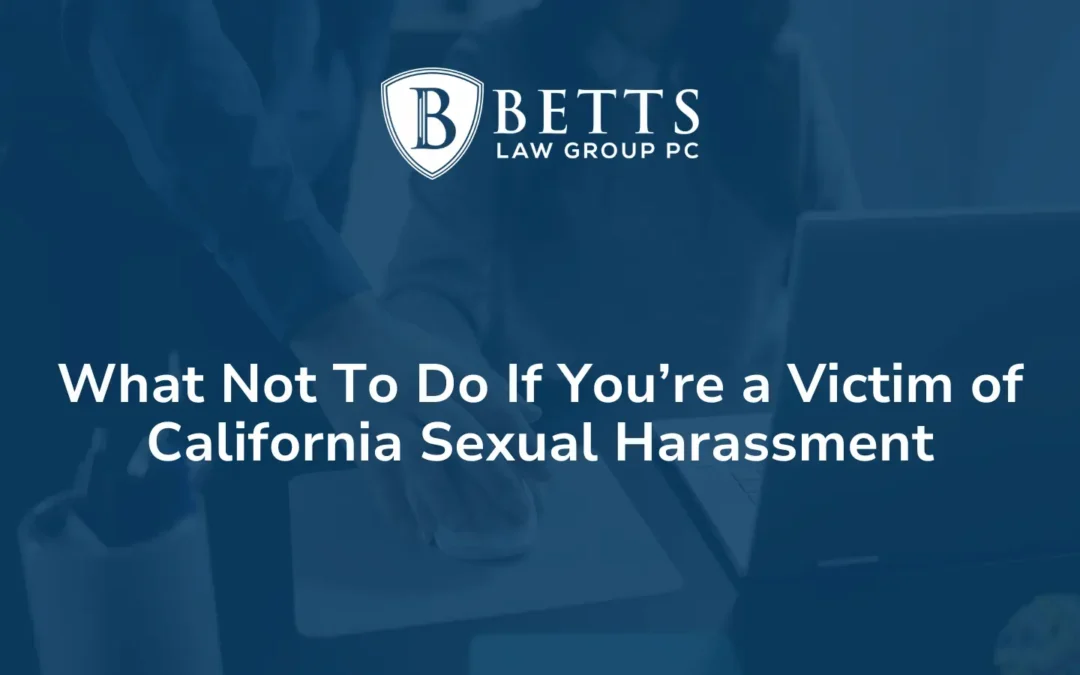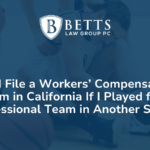If you’ve experienced sexual harassment in the workplace or anywhere in California, you may feel angry, ashamed, humiliated, and afraid to speak up. These feelings may feel overwhelming, but they shouldn’t stop you from taking steps to protect yourself. California has some of the strongest laws in the country to safeguard employees from sexual harassment, and you don’t have to face this alone. Isolating victims into believing they don’t have rights is a common tactic used to intimidate and keep people from asserting their rights. You don’t have to stand alone.
At Betts Law Group, we are committed to protecting victims of sexual harassment. Our founding attorneys, Thomas Betts and Whitney Betts, bring years of focused experience in California sexual harassment law. We’ve guided clients across a wide range of industries through complex harassment claims, and we’re here to help you navigate your next steps with clarity and confidence.
If you’ve been harassed at work, knowing what not to do can be just as important as knowing what to do. Here’s what not to do if you’ve been harassed in the workplace:
Do Not Delete or Destroy Evidence
You may feel a strong urge to erase offensive messages, inappropriate images, or texts, especially if they feel triggering. However, this evidence could be essential to your legal claim.
Keep the following:
- Emails or messages containing inappropriate comments or requests
- Screenshots of social media messages
- Photos of offensive workplace displays
- Notes or journals detailing incidents
- Calendar confirmations of meetings where incidents occurred
Store everything securely, either in a cloud folder or printed and dated, and back it up if possible.
Don’t Wait Too Long to Speak Up
California law, under Gov. Code § 12960, gives you three years from the last act of harassment to file a complaint with the Civil Rights Department (formerly DFEH). Federal timelines with the EEOC are even shorter. Even if you are not sure you want to take legal action, consulting with an attorney quickly can help guide you so you can make the best decisions for yourself in the short and long term.
If you delay:
- Key evidence may be lost
- Witnesses may forget or move on
- Your legal options could expire
Act quickly, not only to protect your rights but also to help stop the behavior from escalating or affecting others. While what happened to you is never your fault or obligation to fix, you can empower yourself and others by letting Betts Law Group fight for you.
Don’t Accept Excuses for Inaction
Many employers try to minimize harassment or deflect blame. Be cautious if you hear things like:
- “He didn’t mean anything by it.”
- “That’s just how she jokes.”
- “They’re not our employee, so it’s not our responsibility.”
- “You’re a contractor, not a real employee.”
California’s Fair Employment and Housing Act (FEHA) applies to:
- Employees
- Interns
- Volunteers
- Independent contractors
- Temporary and seasonal workers
Hence, employers must take action even if the harasser is a client, vendor, or third party. Be bold. Ask them how it is a joke, or how it is funny. Harassment has no logical legal excuse in a majority of instances.
Don’t Assume You’re the Only Victim
Many people stay silent because they think they’re alone, but harassers often target multiple people. If something feels wrong, there’s a chance others have experienced similar treatment.
Even if:
- The harassment was directed at a coworker
- You were a witness, not a target
- No one else has spoken up
You still have the right to report it. Your report may be the key to uncovering a pattern of misconduct.
Don’t Let Fear of Retaliation Stop You
Retaliation is illegal under Gov. Code § 12940(h). If your employer punishes you for reporting harassment by cutting your hours, demoting you, firing you, or isolating you, you may have a separate legal claim.
The law protects you from retaliation, and at Betts Law Group, we work aggressively to hold employers accountable when they try to silence victims.
Don’t Try to “Handle It Yourself
You might think confronting the harasser or HR privately will resolve the situation. But these informal attempts can backfire if:
- HR is biased toward management
- The issue is downplayed or not documented
- The harasser retaliates before a formal complaint is filed
Instead, you should opt doing the following:
- Follow your company’s official reporting procedures
- Document everything
- Contact an attorney as early as possible
California employers are legally obligated under 2 CCR § 11023 to provide written anti-harassment policies, complaint channels, and a safe reporting process. Betts Law Group can help assess if your policies are legally compliant, potentially finding additional legal theories you can recover on.
What Does California’s Legal Protections Include?
Under both FEHA and Title VII of the Civil Rights Act of 1964, sexual harassment is a form of discrimination. California recognizes both:
- Quid pro quo harassment: When job benefits (or threats) are linked to sexual conduct.
- Hostile work environment harassment: When unwanted sexual behavior is pervasive or severe, and interferes with your ability to do your job.
FEHA applies to employers with five or more employees, and even broader protections are in place for workers who might not be fully covered under federal law.
Contact Our Sexual Harassment Lawyers at Betts Law Group Today
You deserve to feel safe, respected, and protected at work. If you’ve experienced sexual harassment in the workplace, don’t let fear, shame, or confusion keep you from asserting your rights. At Betts Law Group, our employment lawyers believe in standing up for those who’ve been mistreated, and we do it with compassion, strength, and purpose.
Contact us today to schedule a confidential consultation. We’ll help you understand your options and take the next step forward on your terms.





